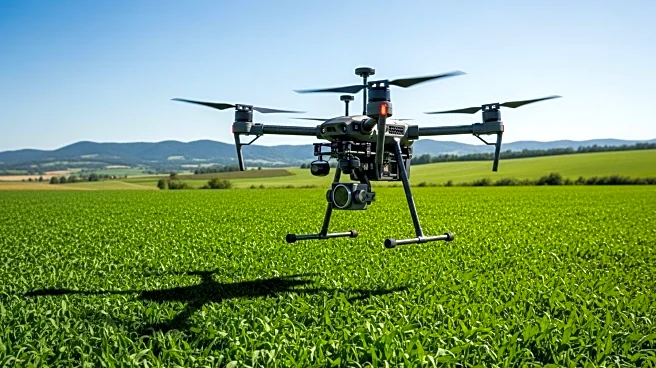What's Happening?
The precision agriculture market is experiencing significant growth, with projections indicating an increase from USD 10.3 billion in 2023 to USD 35.6 billion by 2033, at a compound annual growth rate (CAGR) of 13.20%. Precision agriculture, which involves site-specific crop management and satellite agriculture, aims to enhance farming processes through advanced technology. This approach is particularly beneficial in developing countries, where it supports sustainable practices and optimizes financial returns. The market's expansion is fueled by the rising demand for food and the need for improved agricultural technologies. Key segments contributing to this growth include automation and control systems, GNSS/GPS systems, and yield monitoring. North America is expected to hold the largest market share, driven by established agricultural machinery manufacturers and favorable government policies.
Why It's Important?
The growth of the precision agriculture market is crucial for addressing global food security challenges. As the demand for food increases, precision agriculture offers solutions to enhance crop yields and resource management. This technology supports farmers in adopting sustainable practices, which are essential for mitigating the impacts of climate change and resource depletion. The expansion of this market also signifies a shift towards more automated and digitized farming, which can lead to increased efficiency and reduced environmental impact. Stakeholders such as farmers, technology providers, and government authorities stand to benefit from these advancements, as they contribute to a more resilient agricultural sector.
What's Next?
The precision agriculture market is poised for further growth, with Asia-Pacific expected to experience the fastest CAGR due to agricultural modernization in countries like China, India, and Indonesia. As population growth pressures the agriculture industry to boost production, the demand for precision farming equipment is likely to increase. Companies like AGCO Corporation are investing in innovation funds to support the development of advanced solutions for future farming needs. Continued collaboration between technology providers and agricultural stakeholders will be essential for driving market expansion and achieving sustainable agricultural practices.
Beyond the Headlines
The expansion of precision agriculture has broader implications for global food security and environmental sustainability. By enabling more efficient use of resources, precision agriculture can help reduce the environmental footprint of farming practices. Additionally, the integration of technology in agriculture may lead to shifts in labor dynamics, as automated systems replace traditional farming methods. Ethical considerations regarding data privacy and the equitable distribution of technological benefits may also arise as precision agriculture becomes more widespread.









